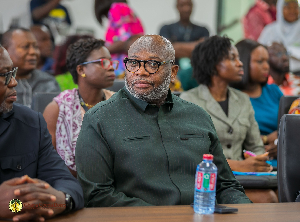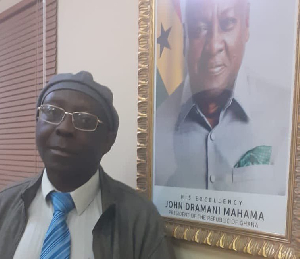Professor Wisdom Akpalu, Director of Environmental and Natural Resource Research Initiative (ENRRI-EfD Ghana), has called for pragmatic steps to address challenges in Ghana’s fisheries sector to save the country's fishing industry.
“There is a danger that the stocks would completely collapse and the fishermen would not get fish anymore and we have to import all this fish from elsewhere when we are not even sure of their quality,” the Professor said.
Prof. Akpalu said this on Tuesday during an ENRRI-EfD Ghana Round Table Discussion on how to deal with the challenges facing the fishing industry in Ghana.
In a presentation on Fisheries Regulations and Enforcement in Ghana, Prof. Akpalu observed the need to sacrifice and resolve issues in the sector since Ghana could not depend solely on imported fish with its huge cost implications.
Professor Akpalu, also the Dean, School of Research and Graduate Studies, GIMPA, informed that there was a gradual decline in catch per canoe: 35.4 tons in 1992 as against 15.5 tons in 2016, which had led to an increasing importation of fish to meet demands on the market.
The Fisheries Economist said this was partly because there were too many canoes involved in fishing in Ghanaian waters.
“Currently, Ghana has about 13 thousand canoes when the nation needs about nine thousand to give us the highest benefit,” he informed.
Again, the academician noted that about 90% artisanal fishermen in Ghana use illegal fishing net meshes and indulge in light fishing, which helped to deplete the fish stock.
He also observed that the pressure exerted on the fishing stock from trawl vessels and the need to install video cameras on them to increase effective monitoring and reduce risk to the lives of law enforcement personnel who had to police them to the high seas.
The Professor indicated that currently, offenders in the fisheries sector were not bothered because sanctions that went with violation of fishing laws were not deterrent enough, which had allowed illegalities in the fisheries sector to continue.
Professor Akpalu observed that fishing was necessary, because, unlike mining it is renewable and it could benefit society many years to come and still be viable and therefore needed to be preserved.
He said the sector must also be taken seriously ”because it provided jobs for 2.5 million Ghanaians which included 500,000 women with fish providing about 70% of the protein needs of Ghanaians.
“Fishing contributed about 1-4% annually to the size of the economy, approximately 15% annually to agricultural input, and export revenue to about US$ 15 million annually,” he added.
Prof. Akpalu however hinted that Ghana’s fish and total GDP was declining and should be a source of concern to all.
This Professor attributed the decline to the issue of subsidization of premix fuel in Ghana, observing that subsidizing the fuel to about 60% has encouraged more people to go into fishing, thereby increasing overfishing and helping to deplete Ghana’s fish stock whilst it cost the nation about 200 million Ghana cedis a month.
"Won’t it be better to use this money elsewhere to benefit the same fishermen, than to subsidize premix fuel,” he wondered.
He also lamented on how large percentage of premix fuel ended up in wrong hands, enriched private pockets and cost the nation so much money.
In an open discussion after the presentation, some participants observed that a lot of interferences existed in the enforcement of the law such that officers of the law were prevented from doing their work, which affected effective regulation and monitoring of the fishing industry.
Others were of the view that such enforcing officers were sometimes victimized, which deterred others from upholding the law.
Participants were drawn from the various units of the Fisheries Commission, including the Landing Beach Enforcement Committee and the Landing Beach Enforcement Unit, academia, and the media.
Business News of Wednesday, 10 March 2021
Source: GNA













